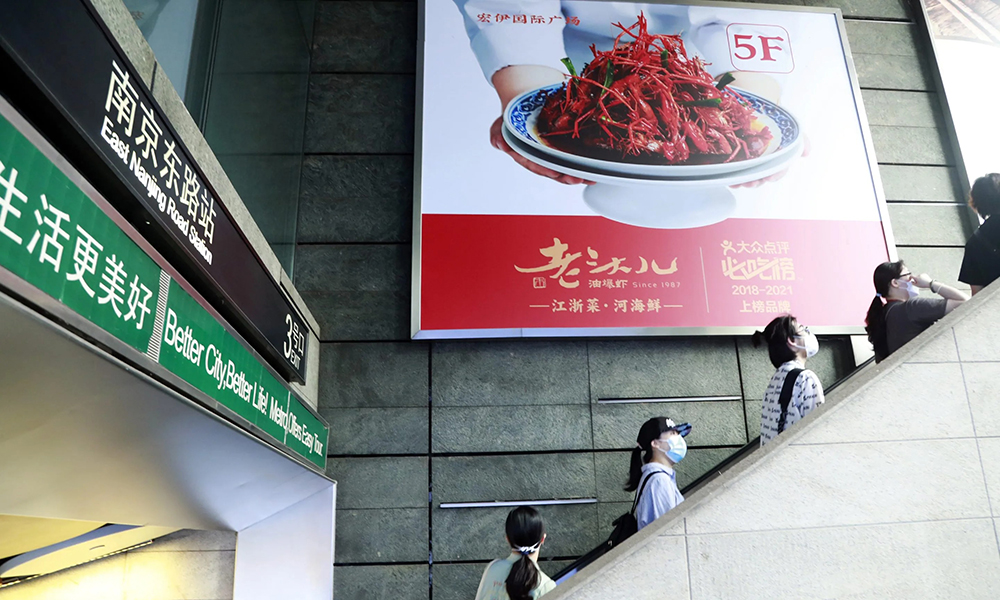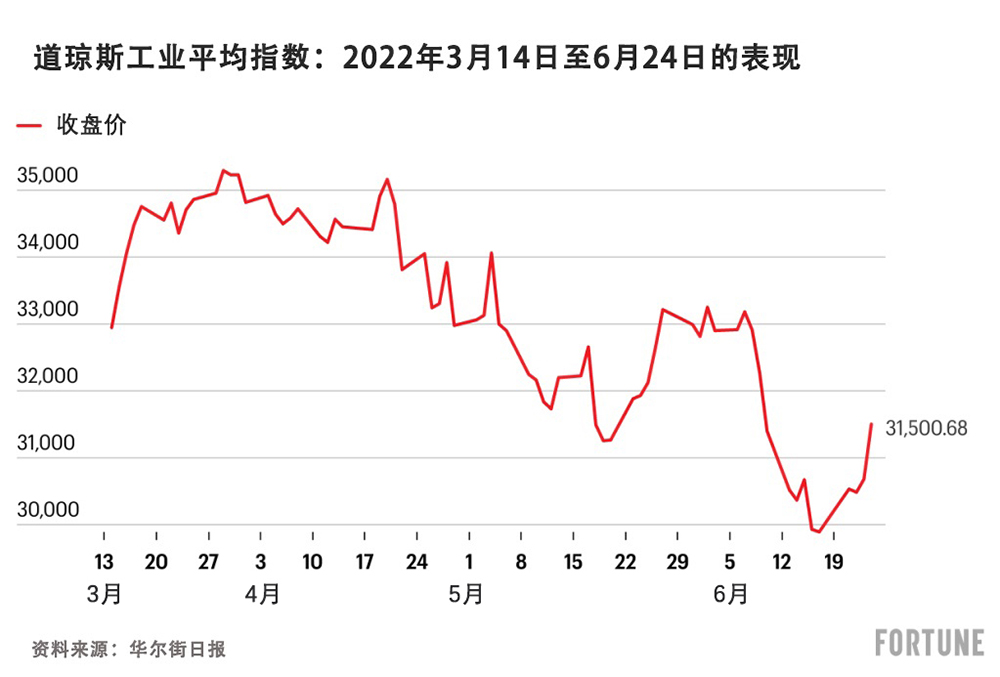中国互联网股票意外反弹,大幅跑赢美国熊市

今年3月,摩根大通(JPMorgan Chase)的科技分析师姚橙和他的研究团队发表了一份报告,宣称中国互联网股票“不可投资”,此举让他意外地成了名人。这一尖锐的评级认定引发了2000亿美元的中国股票抛售,并促使一家中国科技公司后来取消了摩根大通作为其计划中的股票发行高级承销商资格。
今年5月,姚橙再次登上新闻头条,这次他看好中国股票。他将七家中国主要互联网公司的评级从此前的“减持”上调至“增持”,并将另外几家公司的评级上调至“中性”。姚橙并不是唯一一个重新评估中国股市的人。最近几周,高盛集团(Goldman Sachs)、美国银行(Bank of America)、杰富瑞金融集团(Jefferies Financial Group)、东方汇理资产管理公司(Amundi)和花旗银行(Citi)等20家主要投资机构的分析师都看好中国,此前这个全球第二大经济体的股市前景黯淡。市场情绪的转变推动摩根士丹利资本国际公司中国指数(MSCI China Index)自3月15日以来上涨逾20%,该指数是衡量中国内地和离岸市场中国股票的最广泛指标。
其他主要的中国股指也有所上涨。沪深300指数是沪深两市上市公司的主要基准指数,同期上涨近12%。追踪在香港上市的中国股票的恒生中国企业指数(Hang Seng China Enterprises Index)上涨了23%,而以在纳斯达克(Nasdaq)上市的成功中国企业为主的金龙指数(Golden Dragon Index)飙升了近52%。一些分析师现在将中国吹捧为美国和欧洲股市近期暴跌的“避风港”。

2020年11月,中国叫停了蚂蚁集团370亿美元的首次公开募股计划,没有人预测中国科技公司令人眼花缭乱的估值会回归——至少不会很快回归。但高盛集团的中国策略师刘劲津如今表示,中国股市最糟糕的时期可能已经过去。在6月13日的一份报告中,他认为最近的复苏与中国市场早先的调整“持平”,而且可能还有持续的上升空间。刘劲津的乐观态度引人注目,因为他和同事蒂莫西·莫伊是最早使用“不可投资”来形容中国股票的分析师之一。在2021年7月的一份研究报告中,他们注意到,“我们最近与客户就投资中国股票进行的许多对话中都提到了‘不可投资’。”
杰富瑞的全球股票策略师肖恩·达比也认为,中国股市已经渡过难关。“沪深300指数已经触底。”他在6月13日给客户的报告中写道。“我们从‘适度看涨’转为‘看涨’。”
这样的评论与3月14日投资者普遍的悲观情绪相去甚远,当时姚橙将包括阿里巴巴集团、腾讯控股有限公司和美团在内的28只中国互联网股票评级下调至“减持”,认为由于地缘政治和宏观经济风险不断上升,这些股票在未来6个月到12个月内“不可投资”,调低力度异常之大。例如,姚橙将阿里巴巴集团的目标价从180美元下调至65美元,是彭博社(Bloomberg)调查的分析师中最低的。
姚橙对中国互联网股票的严重警告,引发了全球对中国股票几乎所有板块的疯狂抛售。数小时内,香港恒生指数(Hang Seng Index)暴跌6%,至10年来最低水平。当时,中国政府正在多个城市抗击新冠肺炎疫情,科技中心深圳已经封城,外交政策专家警告称,如果中国政府在俄乌冲突中支持俄方,美国可能会对中国实施严厉的经济制裁。在监管部门为期近两年的打击行动之后,中国一度充满活力的互联网巨头仍然笼罩在不确定性的阴云之中。
而在4月,情况变得更糟。上海和北京爆发疫情,促使政府在全市范围内实施严厉的疫情管控措施,全球供应链受到影响,持续了两个月之久。5月6日,五一黄金周后沪深两市复市,沪深300指数跌至两年来最低水平。
但姚橙和他的团队看到了看涨的希望。5月16日,他们以中国政府强有力的政策支持为由,对阿里巴巴集团、腾讯控股有限公司、美团和拼多多等主要中国科技公司的评级进行了上调。
在一份宣布突然逆转的报告中,摩根大通团队提到了3月16日由政府的经济政策负责人刘鹤领导的中国最高金融政策委员会(国务院金融稳定发展委员会)在北京召开的一次会议。媒体报道称,在那次会议上,刘鹤表示政府将实施新措施来提振经济,并应“积极出台对市场有利的政策”。该委员会还决定,应“尽快”完成对中国互联网公司的“整顿”。
当时,全球投资者对刘鹤的评论反响不一。一些人称赞这是一个积极信号,表明政府对资本市场的重视。但其他人认为这些话似乎不足以支持股市反弹。
姚橙和他的团队认为,刘鹤3月16日的声明是中国科技股的关键转折点。他们总结道:“在近期监管公告的背景下,该行业面临的重大不确定性应该会开始减弱。”
5月初,彭博社援引摩根大通匿名消息人士的话称,一项内部调查得出结论,姚橙使用“不可投资”是编辑失误的结果,本不应该发生。摩根大通拒绝对彭博社的报道置评,但在发给通讯社的一封电子邮件中,该公司强调:“我们坚持发布的研究成果和分析师对该行业的独立分析。”
进入6月的时候,姚橙观点的彻底转变看起来越来越高明。上海和北京凭借史无前例的核酸检测和监测措施,成功控制了新冠肺炎疫情并解除了封锁。包括阿里巴巴集团、腾讯控股有限公司、美团和百度在内的多家中国互联网巨头公布的季度财报超出预期,并上调了对今年剩余时间收益的预期。6月8日,中国政府宣布批准60个新的网络游戏牌照,给科技股带来了利好。
最近几周,媒体广泛报道称,监管机构对网约车巨头滴滴出行的数据安全违规行为的调查即将结束,此举将使该公司在中国恢复正常业务运营,并可能推进其在香港上市的计划。
相比之下,由于油价上涨以及美联储(Federal Reserve)和欧洲央行为对抗通胀而宣布大幅加息,美国和欧洲股市均下跌。过去三个月,道琼斯工业平均指数(Dow Jones Industrial Average)下跌了12%,而标准普尔500指数(S&P 500)下跌了16%。“如今减持中国股票是有风险的。”东方汇理资产管理公司的首席投资官文森特·莫蒂尔在5月接受彭博社采访时表示。

目前,有一些全球投资者正在悄悄重返中国股市。摩根士丹利(Morgan Stanley)的首席中国股票策略师王滢一直是对中国股市反弹持最大怀疑态度的人之一,她表示,她目前还不建议客户增持中国股票。但在今年6月的早些时候接受彭博电视台(Bloomberg TV)采访时,她承认中国股市看起来更有吸引力,可能正处于长期熊市的“最后一站”。(财富中文网)
译者:中慧言-王芳
今年3月,摩根大通(JPMorgan Chase)的科技分析师姚橙和他的研究团队发表了一份报告,宣称中国互联网股票“不可投资”,此举让他意外地成了名人。这一尖锐的评级认定引发了2000亿美元的中国股票抛售,并促使一家中国科技公司后来取消了摩根大通作为其计划中的股票发行高级承销商资格。
今年5月,姚橙再次登上新闻头条,这次他看好中国股票。他将七家中国主要互联网公司的评级从此前的“减持”上调至“增持”,并将另外几家公司的评级上调至“中性”。姚橙并不是唯一一个重新评估中国股市的人。最近几周,高盛集团(Goldman Sachs)、美国银行(Bank of America)、杰富瑞金融集团(Jefferies Financial Group)、东方汇理资产管理公司(Amundi)和花旗银行(Citi)等20家主要投资机构的分析师都看好中国,此前这个全球第二大经济体的股市前景黯淡。市场情绪的转变推动摩根士丹利资本国际公司中国指数(MSCI China Index)自3月15日以来上涨逾20%,该指数是衡量中国内地和离岸市场中国股票的最广泛指标。
其他主要的中国股指也有所上涨。沪深300指数是沪深两市上市公司的主要基准指数,同期上涨近12%。追踪在香港上市的中国股票的恒生中国企业指数(Hang Seng China Enterprises Index)上涨了23%,而以在纳斯达克(Nasdaq)上市的成功中国企业为主的金龙指数(Golden Dragon Index)飙升了近52%。一些分析师现在将中国吹捧为美国和欧洲股市近期暴跌的“避风港”。
2020年11月,中国叫停了蚂蚁集团370亿美元的首次公开募股计划,没有人预测中国科技公司令人眼花缭乱的估值会回归——至少不会很快回归。但高盛集团的中国策略师刘劲津如今表示,中国股市最糟糕的时期可能已经过去。在6月13日的一份报告中,他认为最近的复苏与中国市场早先的调整“持平”,而且可能还有持续的上升空间。刘劲津的乐观态度引人注目,因为他和同事蒂莫西·莫伊是最早使用“不可投资”来形容中国股票的分析师之一。在2021年7月的一份研究报告中,他们注意到,“我们最近与客户就投资中国股票进行的许多对话中都提到了‘不可投资’。”
杰富瑞的全球股票策略师肖恩·达比也认为,中国股市已经渡过难关。“沪深300指数已经触底。”他在6月13日给客户的报告中写道。“我们从‘适度看涨’转为‘看涨’。”
这样的评论与3月14日投资者普遍的悲观情绪相去甚远,当时姚橙将包括阿里巴巴集团、腾讯控股有限公司和美团在内的28只中国互联网股票评级下调至“减持”,认为由于地缘政治和宏观经济风险不断上升,这些股票在未来6个月到12个月内“不可投资”,调低力度异常之大。例如,姚橙将阿里巴巴集团的目标价从180美元下调至65美元,是彭博社(Bloomberg)调查的分析师中最低的。
姚橙对中国互联网股票的严重警告,引发了全球对中国股票几乎所有板块的疯狂抛售。数小时内,香港恒生指数(Hang Seng Index)暴跌6%,至10年来最低水平。当时,中国政府正在多个城市抗击新冠肺炎疫情,科技中心深圳已经封城,外交政策专家警告称,如果中国政府在俄乌冲突中支持俄方,美国可能会对中国实施严厉的经济制裁。在监管部门为期近两年的打击行动之后,中国一度充满活力的互联网巨头仍然笼罩在不确定性的阴云之中。
而在4月,情况变得更糟。上海和北京爆发疫情,促使政府在全市范围内实施严厉的疫情管控措施,全球供应链受到影响,持续了两个月之久。5月6日,五一黄金周后沪深两市复市,沪深300指数跌至两年来最低水平。
但姚橙和他的团队看到了看涨的希望。5月16日,他们以中国政府强有力的政策支持为由,对阿里巴巴集团、腾讯控股有限公司、美团和拼多多等主要中国科技公司的评级进行了上调。
在一份宣布突然逆转的报告中,摩根大通团队提到了3月16日由政府的经济政策负责人刘鹤领导的中国最高金融政策委员会(国务院金融稳定发展委员会)在北京召开的一次会议。媒体报道称,在那次会议上,刘鹤表示政府将实施新措施来提振经济,并应“积极出台对市场有利的政策”。该委员会还决定,应“尽快”完成对中国互联网公司的“整顿”。
当时,全球投资者对刘鹤的评论反响不一。一些人称赞这是一个积极信号,表明政府对资本市场的重视。但其他人认为这些话似乎不足以支持股市反弹。
姚橙和他的团队认为,刘鹤3月16日的声明是中国科技股的关键转折点。他们总结道:“在近期监管公告的背景下,该行业面临的重大不确定性应该会开始减弱。”
5月初,彭博社援引摩根大通匿名消息人士的话称,一项内部调查得出结论,姚橙使用“不可投资”是编辑失误的结果,本不应该发生。摩根大通拒绝对彭博社的报道置评,但在发给通讯社的一封电子邮件中,该公司强调:“我们坚持发布的研究成果和分析师对该行业的独立分析。”
进入6月的时候,姚橙观点的彻底转变看起来越来越高明。上海和北京凭借史无前例的核酸检测和监测措施,成功控制了新冠肺炎疫情并解除了封锁。包括阿里巴巴集团、腾讯控股有限公司、美团和百度在内的多家中国互联网巨头公布的季度财报超出预期,并上调了对今年剩余时间收益的预期。6月8日,中国政府宣布批准60个新的网络游戏牌照,给科技股带来了利好。
最近几周,媒体广泛报道称,监管机构对网约车巨头滴滴出行的数据安全违规行为的调查即将结束,此举将使该公司在中国恢复正常业务运营,并可能推进其在香港上市的计划。
相比之下,由于油价上涨以及美联储(Federal Reserve)和欧洲央行为对抗通胀而宣布大幅加息,美国和欧洲股市均下跌。过去三个月,道琼斯工业平均指数(Dow Jones Industrial Average)下跌了12%,而标准普尔500指数(S&P 500)下跌了16%。“如今减持中国股票是有风险的。”东方汇理资产管理公司的首席投资官文森特·莫蒂尔在5月接受彭博社采访时表示。
目前,有一些全球投资者正在悄悄重返中国股市。摩根士丹利(Morgan Stanley)的首席中国股票策略师王滢一直是对中国股市反弹持最大怀疑态度的人之一,她表示,她目前还不建议客户增持中国股票。但在今年6月的早些时候接受彭博电视台(Bloomberg TV)采访时,她承认中国股市看起来更有吸引力,可能正处于长期熊市的“最后一站”。(财富中文网)
译者:中慧言-王芳
JPMorgan Chase technology analyst Alex Yao earned unwanted celebrity in March when he and his research team published a report declaring Chinese internet stocks “uninvestable.” That scathing designation ignited a $200 billion selloff of China shares—and prompted one Chinese technology company to later remove JPMorgan as the senior underwriter for a planned stock offering.
In May, Yao made headlines again, this time as a China bull. He revised his rating of seven leading Chinese internet firms to “overweight,” up from an earlier “underweight” rating, and bumped up several more to “neutral.” Yao isn’t alone in his reassessment of China shares. In recent weeks analysts at a score of leading investment houses—Goldman Sachs, Bank of America, Jefferies Financial Group, Amundi, and Citi—have brightened formerly dim outlooks for equities in the world’s second-largest economy. The shift in sentiment has helped to drive the MSCI China Index, the broadest measure of China stocks on mainland and offshore markets, up more than 20% since March 15.
Other key China stock indexes have gained as well. The CSI 300, the leading benchmark of companies listed on exchanges in Shanghai and Shenzhen, has risen nearly 12% during that same interval. The Hang Seng China Enterprises Index, which tracks Chinese shares traded in Hong Kong, is up 23%, while the Golden Dragon Index, dominated by high-flying Chinese companies listed on the Nasdaq, has soared nearly 52%. Some analysts now tout China as a “safe haven” from recent carnage in U.S. and Europe markets.
No one is predicting a return—at least not anytime soon—to the dizzying valuations commanded by Chinese tech companies before November 2020, when Chinese government squelched a $37 billion initial public offering planned by Ant Group, the sprawling mobile payments company controlled by billionaire Jack Ma. But Goldman Sachs China strategist Kinger Lau now says the worst may be over for China shares. In a June 13 report, he argued that the recent recovery is “on par” with earlier China market corrections and may yet have room to run. Lau’s upbeat take is notable because he and colleague Timothy Moe were among the first analysts to use the “u-word” in connection with China. In a July 2021 research note they observed that “’uninvestable’ has featured in many of our recent conversations with clients regarding investing in Chinese stocks.”
Sean Darby, global equity strategist at Jefferies, also believes China shares have turned the corner. “A bottom has been made in the CSI 300,” he wrote in June 13 note to clients. “We upgrade to Bullish from Modestly Bullish.”
Such comments are a far cry from the gloom that prevailed among investors on March 14, when Yao downgraded 28 Chinese internet stocks including Alibaba Group Holding, Tencent Holdings, and Meituan to “underweight,” deeming them “uninvestable” for the next six to 12 months owing to rising geopolitical and macroeconomic risks. The write-downs were unusually aggressive. For example, Yao slashed his price target for Alibaba to $65, down from $180, making it the lowest among analysts surveyed by Bloomberg.
Yao’s dire warning about Chinese internet stocks prompted a global stampede out of China stocks in nearly every sector. In hours, Hong Kong’s Hang Seng Index plunged 6% to its lowest level in 10 years. At the time, Chinese authorities were battling COVID-19 outbreaks in multiple cities, the tech hub of Shenzhen already was in COVID lockdown, and foreign policy experts warned that the U.S. might hit China with harsh economic sanctions if Beijing backed Russia’s invasion of Ukraine. China’s once-dynamic internet giants remained shrouded in a cloud of uncertainty in the wake of a nearly two-year regulatory crackdown.
And in April, things got worse. The virus flared in Shanghai and Beijing, prompting authorities to impose harsh citywide lockdowns that dampened Chinese consumption, snarled global supply chains, and dragged on for two months. On May 6, when exchanges in Shanghai and Shenzhen reopened after the nation’s “Golden Week” holiday, the CSI 300 index tumbled to its lowest level in two years.
But Yao and his team saw reasons for optimism. On May 16, they upgraded a passel of leading Chinese tech companies including Alibaba, Tencent, Meituan, and Pinduoduo citing strong policy support from Beijing.
In a report announcing the abrupt reversal, the JPMorgan team referenced a March 16 meeting in Beijing of China’s top financial policy committee led by Liu He, the government’s economic policy czar. In that meeting, according to accounts in China’s state-controlled press, Liu vowed the government would implement new measures to boost the economy and should “actively introduce policies that benefit markets.” The committee also resolved that measures to “rectify” China’s internet companies should be completed “as soon as possible.”
Liu’s comments had drawn mixed reviews from global investors at the time. Some hailed them as a signal that China’s leaders, who had long seemed oblivious to the worldwide selloff in China stocks, now recognized they needed to do something to reverse it. But others dismissed the remarks as empty rhetoric.
Yao and his team deemed Liu’s March 16 pronouncements a key turning point for Chinese tech shares. “Significant uncertainties facing the sector should begin to abate on the back of recent regulatory announcements,” they concluded.
In early May, Bloomberg, citing anonymous JPMorgan sources, reported that an internal investigation had concluded that Yao’s use of the “u-word” was the result of an editorial screwup and should never have happened. JPMorgan declined to comment on the Bloomberg report, but in an e-mail sent to the news service the firm stressed that “we stand by our published research and the analyst’s independent analysis of the sector.”
As May gave way to June, Yao’s volte-face looked increasingly shrewd. Shanghai and Beijing, by dint of unprecedented testing and surveillance measures, managed to contain their COVID outbreaks and were exiting lockdown. A parade of Chinese internet giants, including Alibaba, Tencent, Meituan, and Baidu, announced better-than-expected quarterly financial results and raised their estimates for earnings for the rest of the year. On June 8, Beijing gave tech stocks a positive jolt by announcing the approval of 60 new online game licenses.
In recent weeks, there have been widespread media reports that regulators are on the verge of concluding their probe into data security violations at ride-hailing giant Didi Chuxing, a move that would allow the company to resume normal business operations in China—and potentially move forward with plans to float shares in Hong Kong.
Meanwhile, declines in U.S. and Europe markets in response to higher oil prices and aggressive interest rate hikes announced by the Federal Reserve and European central banks to combat inflation have helped China shares regain at least part of their lost luster. The Dow Jones industrial average has fallen 12% over the past three months, while the S&P 500 has slumped 16%. “To be underweight Chinese equities today is risky,” Vincent Mortier, Amundi’s chief investment officer declared in a May interview with Bloomberg.
For now, though, it seems clear that at least some global investors are tiptoeing back to Chinese equities. Morgan Stanley chief China equity strategist Laura Wang, who has been among the biggest skeptics of the idea of a China rally, says she’s not recommending clients load up on China shares yet. But in an interview with Bloomberg TV earlier June, she conceded that China stocks are looking more attractive and may be on the “last leg” of an extended bear market.













